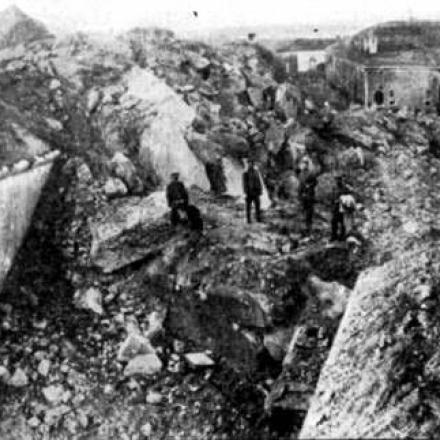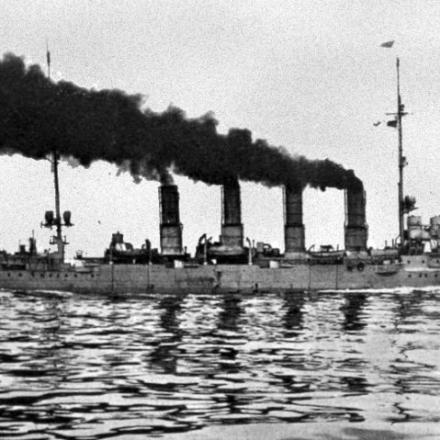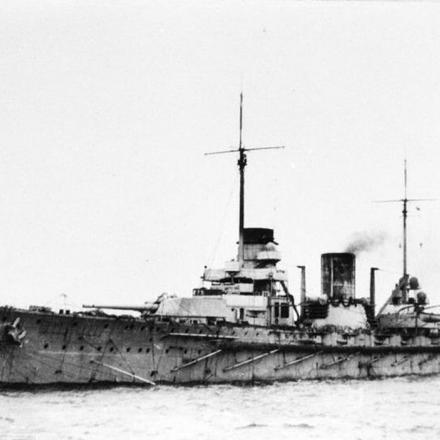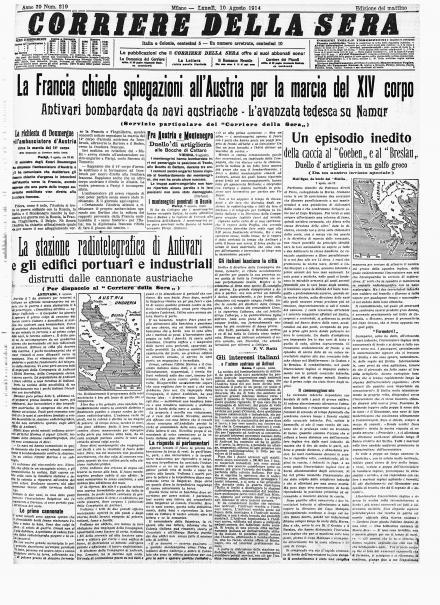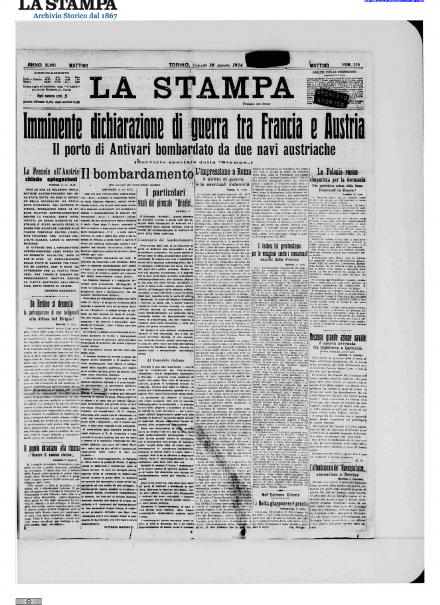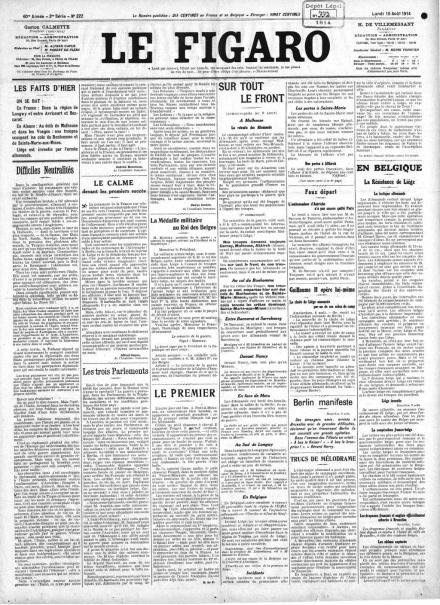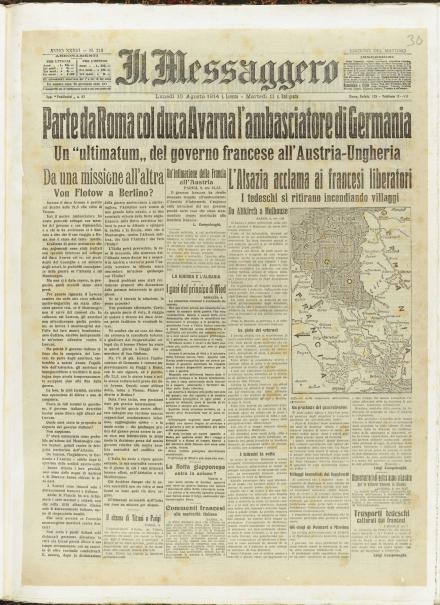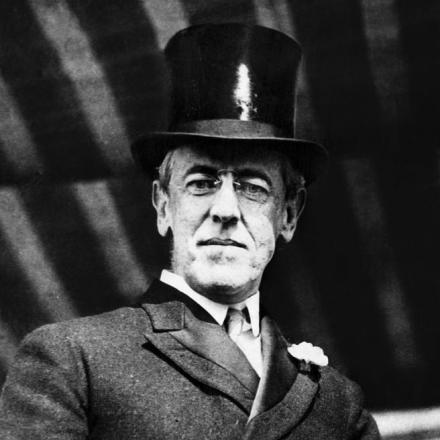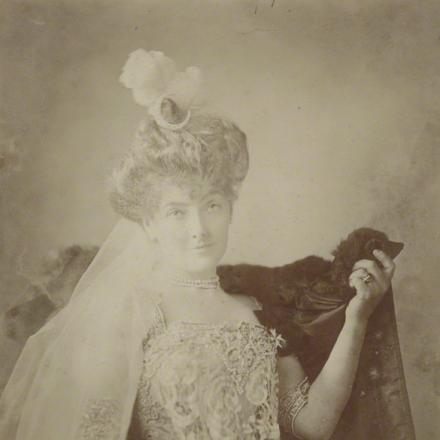La caduta di Liegi
Guglielmo II si sta rendendo conto di cosa significhi questo conflitto. Meno altezzoso e più inquieto, il Kaiser rimugina. Parla con l’Ambasciatore americano e si sofferma sugli inglesi: «Fanno la differenza, sono una nazione ostinata. Continueranno a combattere. Non finirà presto». Già, sono gli inglesi a far più paura. Francia e Russia sono lì, certo, con gli eserciti alle frontiere. Ma nessuno ha l’impero britannico alle spalle.
Il 10 agosto però è un buon giorno per la Germania: il Governo turco ha permesso il passaggio di due incrociatori tedeschi nello stretto dei Dardanelli, salvandoli dalla flotta britannica. È un segnale importante quello lanciato dal “neutrale” Impero Ottomano: con la Germania i rapporti sono ottimi; ed è un grosso sgarbo a Londra.
In più Berlino può festeggiare la controffensiva in Alsazia: Mulhouse è tornata in mani tedesche, i francesi si ritirano. Ed è caduta Liegi, questa volta sul serio.
Se i russi hanno sconfinato in Prussia, sul fronte orientale stanno entrando in gioco gli austro-ungarici. La prima armata avanza verso nord, minacciando Lublino e Kielce.
Le truppe asburgiche manovrerebbero anche a due passi dal confine francese. A Parigi non la prendono bene; le due nazioni non sono in guerra tra loro, non ancora almeno. I francesi chiedono spiegazioni dettagliate, ma dall’Ambasciatore austro-ungarico ricevono solo smentite. Il “non è vero” suona un po’ troppo bugiardo; la rottura dei rapporti diplomatici è inevitabile.
Davide Sartori
GLI AVVENIMENTI
Politica e società
- La Francia interrompe le relazioni diplomatiche con l’Impero austro-ungarico.
- L’Austria-Ungheria proclama il blocco delle coste montenegrine da Spitza al confine albanese.
- Il Presidente della Repubblica francese Poincaré invita il Presidente del Consiglio a interessarsi della sorte degli italiani che in Francia sono rimasti senza lavoro per la guerra.
- Deciso il pattugliamento aereo della costa inglese per la protezione dei trasporti.
Fronte occidentale
- I tedeschi occupano la città di Liegi.
- Alsazia: ritirata francese, i tedeschi riconquistano Mulhouse.
- Lorena: i francesi, comandati dal Generale de Castelnau, avanzano in forze.
Fronte orientale
- La Prima armata austriaca del Conte Viktor Dankl von Krasnik avanza verso Lublino e Kielce.
- I russi raggiungono Tilsit (Sovetsk) nella Prussia orientale.
Fronte d’oltremare
- Sud Africa: i tedeschi assaltano Cape Colony (dal sud-ovest dell’Africa) ma abbandonano Swakopmund e Luderitz Bay.
Operazioni navali
- Le navi da guerra tedesche “Goeben” e “Breslau” attraversano i Dardanelli.
Parole d'epoca
Guglielmo II
Telegramma al Presidente degli Stati Uniti Wilson
Testo del telegramma consegnato all'ambasciatore Gerard da Guglielmo II, in risposta all'offerta di negoziare del presidente USA
For the President of the United States personally.
10/VIII 14.
1. H. R. H. Prince Henry was received by his Majesty King George V in London, who empowered him to transmit to me verbally, that England would remain neutral if war broke out on the Continent involving Germany and France, Austria and Russia. This message was telegraphed to me by my brother from London after his conversation with H. M. the King, and repeated verbally on the twenty-ninth of July.
2. My Ambassador in London transmitted a message from Sir E. Grey to Berlin saying that only in case France was likely to be crushed England would interfere.
3. On the thirtieth my Ambassador in London reported that Sir Edward Grey in course of a "private" conversation told him that if the conflict remained localized beween *Russia* -not Serbia -and *Austria*, England would not move, but if we "mixed" in the fray she would take quick decisions and grave measures; i.e., if I left my ally Austria in the lurch to fight alone England would not touch me.
4. This communication being directly counter to the King's message to me, I telegraphed to H. M. on the twenty-ninth or thirtieth, thanking him for kind messages through my brother and begging him to use all his power to keep France and Russia-his Allies-from making any war-like preparations calculated to disturb my work of mediation, stating that I was in constant communication with H. M. the Czar. In the evening the King kindly answered that he had ordered his Government to use every possible influence with his Allies to refrain from taking any provocative military measures. At the same time H. M. asked me if I would transmit to Vienna the Britiih proposal that Austria was to take Belgrade and a few other Serbian towns and a strip of country as a "main-mise" to make sure that the Serbian promises on paper should be fulfilled in reality. This proposal was in the same moment telegraphed to me from Vienna for London, quite in conjunction with the British proposal; besides, I had telegraphed to H. M. the Czar the same as an idea of mine, before I received the two communications from Vienna and London, as both were of the same opinion.
5. I immediately transmitted the telegrams vice versa to Vienna and London. I felt shat I was able to tide the question over and was happy at the peaceful outlook.
6. While I was preparing a note to H. M. the Czar the next morning, to inform him that Vienna, London and Berlin were agreed about the treatment of affairs, I received the telephones from H. E. the Chancellor that in the night before the Czar had given the order to mobilize the whole of the Russian army, which was, of course, also meant against Germany; whereas up till then the southern armies had been mobilized against Austria.
7. In a telegram from London my Ambassador informed me he understood the British Government would guarantee neutrality of France and wished to know whether Germany would refrain from attack. I telegraphed to H. M. the King personally that mobilization being already carried out could not be stopped, but if H. M. could guarantee with his armed forces the neutrality of France I would *refrain from attacking her, leave her alone* and employ my troops *elsewhere*. H. M. answered that he thought my offer was based on a misunderstanding; and, as far as I can make out, Sir E. Grey never took my offer into serious consideration. He never answered it. Instead, he declared England had to defend Belgian neutrality, which had to be violated by Germany on strategical grounds, news having been received that France was already preparing to enter Belgium, and the King of Belgians having refused my petition for a free passage under guarantee of his country's freedom. I am most grateful for the President's message.
Parole d'epoca
Lady Harriet Julia Camppbell Jephson
Diario di viaggio
The "Frankfurter Zeitung" calls England "ehrlos" (dishonourable), and the Belgian frontier question "only an excuse", and even kind, good Dr. G____ raged against England.
One is sick with longing to hear how the war gets on from the English point of view.
The paper here never allude to England's movements-only to her moral delinquencies. I am so poverty-stricken now I wash my own pocket-handkerchiefs, guimpes, and blouses!
The American part of our community have quite recovered their spirits since money has come for them.
The United States is making every effort to rescue her people, and get them back in safety to America.
No one seems to concern themselves about us, and we can't get away while mobilising is going on. All Germans show the greatest deference to Americans, and call them "our honoured ones, and in disgrace!
Altheim people so far are passably civil to us but sometimes on has a disagreeable person to deal with, as I had to-day at the Bad Haus.
The girl who stamps our tickets refused to pass mine until I could show her my Kur Karte.
I had none, and told her so, and asked her why I should pay twenty marks for a card, when I coul not get any of the privileges to which it entitled me: the band, terrace, reading-room, and so on.
Her answer was a persistent dogged reiteration of "Sie mussen eine Kur Karte haben, sonst konnen Sie nicht bade", and not having twenty marks in the world as present. I had to come away without my bath. Every day there are fresh appeals to the patriotism of the people.
They are pasted on walls, windows, and even trees.
"A war-time Jornal, Germany 1914 and German travel notes"
